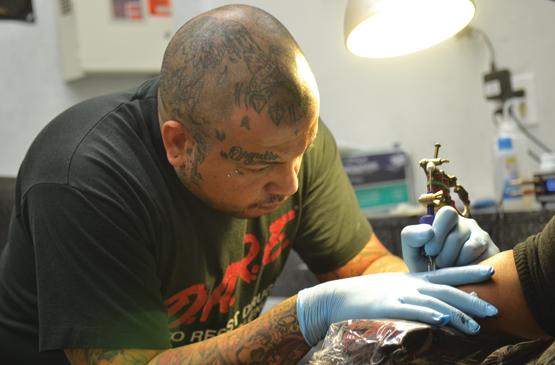Students provide lucrative market for body artists

October 10, 2013
Tattoo artist Ricky Knuxx and the employees of Hot Rod Body Piercing Company love back-to-school season.
Not for the deals on school supplies, but because their customer base returns to campus.
“Our slowest months are August and December,” Knuxx said. “[In August,] students are still getting settled in. But, when they’re done, that’s when they start coming to see the tattoo man.”
Jester’s Court Tattoo Shop, where Knuxx works, and Hot Rod Body Piercing Company are located on Oakland Avenue, just three blocks away from the Cathedral of Learning, and are visible from a portion of the windows in the Litchfield Towers freshman residence hall.
Knuxx estimated that 70 percent of the store’s clientele is college students, who fall in the age group most likely to purchase body modifications, including tattoos and piercings.
“You’ll have knuckleheads banging on the door, saying, ‘Open up. I have to get to class in 10 minutes and I want to get a tattoo,’” Knuxx said.
The shop sees anywhere from 30 to 100 students a week, Knuxx said, but business varies depending on if exams or events such as Homecoming are going on at the University.
“It’s kind of like a numbers game. As long as you learn the schedule of the kids and when your down time is, then business is not that bad,” Knuxx said.
Above Jester’s Court Tattoo is the original shop location for the Hot Rod Body Piercing Company, which also has a location on the South Side. Gino Maione, who has been employed by Hot Rod for 10 years, estimated that between 80 and 85 percent of the store’s business comes from the steady traffic of students going in and out of the store.
“When the kids come back from summer, we get slammed,” Nick Miller, who has worked at Hot Rod Body Piercing Company for three years, said.
According to a 2010 study by the Pew Research Center, more young people today get tattoos than ever before.
The study interviewed more than 2,000 participants aged 18 and older. Two-fifths of the 18- to 26-year-olds whom the researchers interviewed had at least one tattoo, and two-thirds of those with tattoos had more than one. A quarter of 18- to 26-year-olds also had a piercing somewhere other than the ear lobes.
Knuxx estimated that 40 percent of the students that Jester’s Court has serviced received their first tattoo at the shop.
Benji Rolotti, a Pitt sophomore, said he got his first tattoo in March 2012 during an impromptu trip to Jester’s Court Tattoo shop with his friends, including sophomore Loren Brutsch.
“I was just sitting in Market [Central] with Loren and she was like, ‘Hey, do you want to get a tattoo?’” Rolotti said. “I had been planning to get the tattoo for a while, but it was a kind of spur-of-the-moment decision.”
On both of Rolotti’s feet, two of his toes are webbed together. As a joke, Rolotti had a small pair of scissors tattooed on the skin webbing his toes together along with the words “cut here.”
Rolotti said that he would have eventually gotten a tattoo, anyway, but the convenience of the shop’s proximity to Pitt caused him to get one more quickly.
“If I didn’t think it was a good shop, I wouldn’t have gone there,” Rolotti said. “I’ve known other people who had gotten tattoos there, and they were content with the work.”
Although students enjoy having shops that specialize in body modifications close to campus, some parents have expressed their discontent to the shops’ employees.
“I get parents coming here, saying, ‘This is my daughter’s picture. Do not tattoo her,’” Knuxx said.
Miller said he has also had an experience where a woman came into the shop with a picture of her son, a student at Pitt, and told Miller not to pierce the woman’s son. But Miller said the situation was more playful than serious.
Maione said, legally, parents no longer have the right to dictate the choices of their children who are 18 and older, but tattoos are still a topic in discussions between parents and children.
“A lot of people get threatened with, ‘my parents will stop paying for school if I come home with a piercing,’” Maione said.
He said, though, that he has never heard of an instance when this situation occurred at his shop.
Neither Knuxx nor the employees of Hot Rod Piercing Company said they have ever encountered any trouble with an enraged parent of one of their clients and said they are not worried.
“[Parents] have to cut the umbilical cord. Their kid has the right to sign at the dotted line,” Knuxx said.
Brutsch, who has had her eyebrow and frenulum — the skin attaching the tongue to the cavern of the jaw — pierced at Hot Rod, said she has a right to her own opinion about her body, but still keeps in mind her mother’s wishes.
Brutsch got her eyebrow pierced during the first two months of the 2012-2013 school year, but took the piercing out six months later to appease her mother, who thought a facial piercing could hurt Brutsch’s future career.
“She didn’t want me to miss a chance of getting a really good job because I have a piercing on my face,” Brutsch said. “Though it is getting more popular and body [modifications] are somewhat more accepted than they were a couple decades ago, still people [assume] things when looking at them.”
Jester’s Court Tattoo closes at 8 p.m. and Hot Rod Body Piercing Company closes at 9 p.m., which reduces the odds of students attempting to wander in from a bar or a party to request to be tattooed or pierced while under the influence.
Legally, a person cannot undergo a body modification while intoxicated, but Knuxx said that the shop has not had any problems with clients who had been drinking.
While piercings can be removed and body jewelry can be replaced with a clear retainer piece, tattoos are a more permanent decision. Within limits, Knuxx said he tries to prevent a student from getting a tattoo that they will regret later on in life.
“We try to keep it moral. Some kid comes in here and says, ‘I want this kid’s name on my throat,’ we try and talk him out of it,” Knuxx said. “But if we don’t tattoo it, someone else will.”
This article has been corrected from an earlier version. The original version incorrectly identified Gino Maione as Gino Malone. The Pitt News regrets this error.







